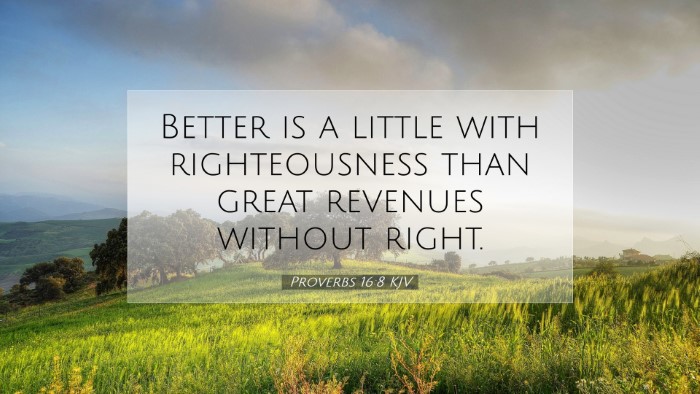Commentary on Proverbs 16:8
Verse Text: "Better is a little with righteousness than great revenues without right."
Introduction
In Proverbs 16:8, we confront a poignant truth that speaks to the heart of both personal integrity and social responsibility. This verse emphasizes the value of righteousness over the mere accumulation of wealth. Its implications resonate deeply with various audiences, including pastors, theologians, and everyday believers.
Analysis of Key Terms
- Little: This denotes scarcity or a small portion, but in this context, it symbolizes contentment and sufficiency.
- Righteousness: A significant Biblical theme, righteousness indicates moral uprightness, compliance with God's laws, and ethical integrity in interpersonal dealings.
- Great Revenues: Represents abundant wealth, financial gain, and materialism, often pursued at the expense of moral virtues.
- Without Right: Implies that wealth obtained through unjust means raises questions of moral legitimacy.
Theological Insights
The overarching theme within Proverbs 16:8 encapsulates the tension between worldly wealth and spiritual integrity. According to Matthew Henry, the "little" signifies not just material scarcity but also a state of contentment grounded in righteousness. This contentment is a form of spiritual wealth that surpasses earthly riches.
Albert Barnes elaborates that the essence of this verse lies in the acknowledgment that material wealth devoid of moral foundation is inherently unstable. In contrast, a humble, righteous life is enduring and brings true satisfaction. Barnes urges believers to seek divine approval rather than human accolades, underscoring God's priority on the heart's condition over material success.
Adam Clarke points out the practical implications of this verse in daily life. He stresses that the pursuit of wealth without integrity leads to spiritual decay. A person may gain riches, but they can also corrode one's moral compass. Clarke emphasizes that God values character and ethical living more than financial accomplishments, which aligns with the broader Biblical narrative that prioritizes the heart's intentions.
Practical Applications
For pastors and spiritual leaders, this verse serves as a reminder that ministry focused on financial success can lead to moral compromise. It calls for a reevaluation of priorities, encouraging leaders to place spiritual and ethical responsibilities at the forefront of their calling.
-
Emphasizing Contentment: Teach congregations about the importance of contentment in Christ, which allows for a richer spiritual life regardless of material circumstances.
-
Modeling Integrity: Position yourself as a model of integrity in financial dealings, demonstrating that God's favor is more valuable than earthly wealth.
Conclusion
Proverbs 16:8 offers profound wisdom regarding the relationship between wealth and righteousness. The insights derived from Matthew Henry, Albert Barnes, and Adam Clarke collectively highlight the essential nature of living a life steeped in integrity, contentment, and moral fortitude. As we navigate the complexities of existence in a material world, this verse admonishes us to discern what true wealth entails—an enduring righteousness that pleases God more than any fleeting gain.


